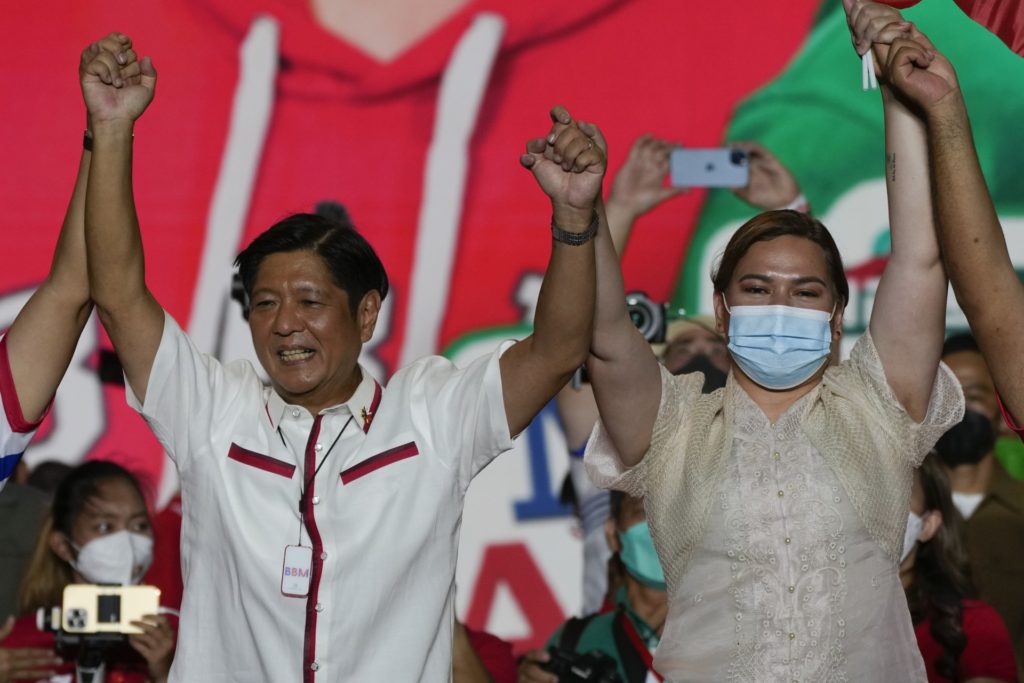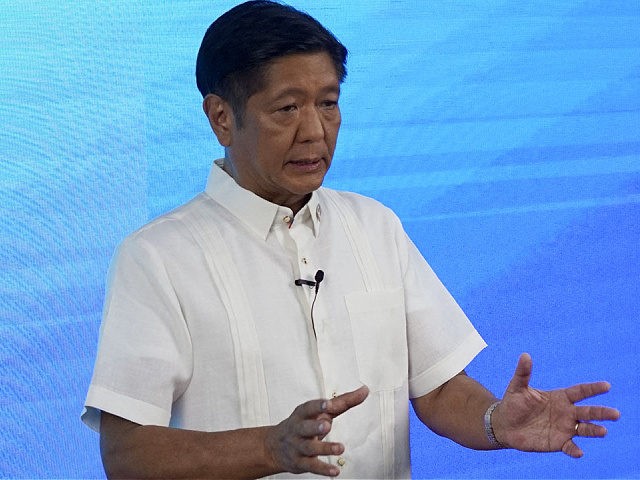Ferdinand Marcos Jr. told reporters on Wednesday he was “ready to hit the ground running” following a presumed victory in the 2022 Philippine presidential election earlier that same day.
Marcos Jr. secured 58.74 percent of votes in the 2022 Philippine presidential election as of May 11 with 98.32 percent of precincts reporting, according to an unofficial tally by the Philippine Commission on Elections (COMELEC). Marcos Jr.’s vote count on Wednesday was double the number for his closest rival in the race, current Philippine Vice President Leni Robredo. The Philippine presidential election, part of a broader general election, took place on May 9.
Ferdinand Marcos Jr., also known by his nickname “Bongbong,” delivered an unofficial acceptance speech on May 11 streamed live online via his Facebook page in which his campaign team referred to him as “Presumptive [Philippine] president Bongbong Marcos.”
Marcos Jr. revealed during the address that he had already taken some preliminary actions in accordance with his assumed win on May 11, including nominating his vice presidential running mate Sara Duterte to oversee the portfolio of the Philippine Education Secretary.
“[O]ur incoming vice president has agreed to take the brief of the Department of Education,” Marcos Jr. told a group of domestic and foreign journalists in Manila during his speech.
Sara Duterte — who is the daughter of current Philippine President Rodrigo Duterte — secured 61.28 percent of the votes counted for the 2022 Philippine vice presidency — which is elected separately from the presidency in the Philippines — as of May 11.
The governments of China and the U.S. on May 10 and May 11, respectively, issued statements welcoming Marcos Jr.’s presumptive new administration to the office of the Philippine presidency.

Presidential candidate, Ferdinand Marcos Jr., the son of the late dictator, raises arms with running mate Davao City Mayor Sara Duterte, the daughter of the current President, during their last campaign rally Saturday, May 7, 2022, in Paranaque city, Philippines. (AP Photo/Aaron Favila, File)
Marcos Jr., 64, is the son of the late Philippine leader Ferdinand Marcos, who occupied the office of the Philippine presidency from 1965 to 1986 during what critics have described as a “dictatorial” or “autocratic” period. Marcos Sr. was himself an ally of the U.S. government in staving off the rise of communism in the Philippines and across the greater Pacific region in the 1980s. A movement sometimes called a “People Power” revolution ousted Marcos Sr. from the Philippine presidency in 1986. Washington facilitated the leader’s exile to the U.S. state of Hawaii shortly after his deposition by allowing him “adequate capacity” to use U.S. military aircraft at Clark Air Force Base, an American military base on the Philippine island of Luzon, to flee nearby Manila in early 1986, the Chicago Tribune reported at the time.
Marcos Sr. was accompanied by his family, including his then 28-year-old son, Marcos Jr., when he accepted U.S. military assistance in flying from Clark Air Force Base to the U.S. territory of Guam and then to the U.S. state of Hawaii in late February 1986.
The story of Marcos Sr.’s exile to Hawaii illustrates the close diplomatic ties established between Manila and Washington during his extensive rule. Clark Air Force base was one of two major U.S. military bases in the Philippines, along with U.S. Naval Station Subic Bay, that bolstered an American presence not only in the Philippines but also in the strategic South China Sea region for most of the 20th century. The two bases, both on Luzon island, are now largely defunct but are still used by visiting U.S. military forces.
The Philippine government, under the administration of current Philippine President Rodrigo Duterte, announced plans in January to work closely with the Chinese government to restore Clark Air Force Base and U.S. Naval Station Subic Bay, in part by building a railway linking the two sites, in a project estimated to cost $940 million.
China’s state-run press agency, Xinhua, reported on January 22 that “negotiations between the two countries over a loan to finance the project would soon begin,” the U.S. military website Stripes relayed.
“Once completed, the railway will build a resilient linkage between ports, railways, and airports along the Subic-Clark corridor, which will improve the logistic efficiency, trim the transportation cost and support the potential demand for freight services and economic activities in the region,” the Chinese Embassy in the Philippines said in a statement.
Marcos Sr. established diplomatic ties between the Philippines and China in 1975. His son’s decision to join forces with Sara Duterte, the daughter of the largely pro-China Philippine President Rodrigo Duterte, indicates that Marcos Jr. will likely continue recent efforts by Manila to extend a closer hand to Beijing.
“Marcos [Jr.] has already said he wants to pursue closer ties with China, including disregarding a 2016 ruling from The Hague invalidating China’s massive territorial claims to the South China Sea,” Radio Free Asia (RFA) observed on May 10.
The U.S. government-funded broadcaster referred to a case brought by Manila to the Permanent Court of Arbitration at The Hague that successfully disputed Beijing’s claims to roughly 90 percent of the shared South China Sea.
“Marcos has sought to distance himself from the ruling, which has been rejected by the Chinese Communist Party (CCP) in Beijing, and said he will likely continue to develop Duterte’s policy of closer ties with China,” RFA noted on Tuesday.

COMMENTS
Please let us know if you're having issues with commenting.